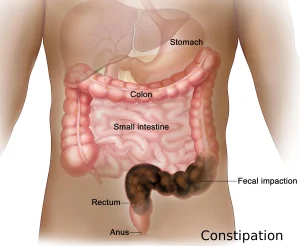Overview
Diagnosis
During your appointment, your healthcare professional will perform a general physical exam and several specific checks to understand the cause of constipation.
They may:
-
Gently press on your abdomen to check for pain, tenderness, or irregular lumps
-
Examine the tissue around the anus and surrounding skin
-
Use a gloved finger to assess the condition of the rectum and anal muscles
You’ll also be asked questions about your medical history, diet, exercise habits, and bowel patterns. For some individuals, this information is sufficient to establish a diagnosis and treatment plan. In other cases, further tests may be needed.
Laboratory tests
Blood tests may be done to check for underlying diseases or metabolic conditions that can cause constipation.
Endoscopy
Your healthcare professional may recommend an endoscopic examination to evaluate the condition of the colon and detect abnormal tissue growth. A small tube with a camera is inserted into the colon. Preparation often involves a restricted diet, use of an enema, or solutions to cleanse the bowel.
Types of endoscopic tests include:
-
Colonoscopy – Examines the rectum and the entire colon
-
Sigmoidoscopy – Examines the rectum and the lower portion of the colon
Imaging tests
Depending on symptoms, imaging tests such as X-rays, CT scans, or MRIs may be ordered. These can show stool buildup, bowel obstruction, or structural abnormalities.
Tests of stool movement
Your doctor may evaluate how stool moves through the colon with a colorectal transit study.
Common types include:
-
Radiopaque marker study – Involves swallowing small pellets and tracking their movement with X-rays
-
Scintigraphy – Uses a meal containing tiny radioactive particles to trace digestion and bowel movement
Tests of the rectum and anus
Certain tests measure how well the rectum and anal muscles function:
-
Anorectal manometry – A flexible tube with a small balloon measures coordination of muscles during stool passage
-
Balloon expulsion test – Assesses how quickly a small water-filled balloon can be expelled
-
Defecography – Uses imaging to evaluate rectal and anal function during simulated stool passage
Treatment
Treatment for constipation typically starts with lifestyle and dietary changes that promote normal bowel movements. If these adjustments do not help, medications or other interventions may be considered.
Diet and lifestyle changes
To help relieve constipation, your healthcare provider may suggest:
-
Eating a high-fiber diet with fruits, vegetables, beans, and whole grains
-
Increasing fluid intake, especially water and non-caffeinated beverages
-
Exercising most days to stimulate bowel function
-
Responding promptly to the urge to pass stool
-
Keeping a regular bowel routine, ideally 15–45 minutes after a meal
-
Eating prunes, which naturally promote bowel movement due to fiber and sorbitol
Laxatives
When diet and lifestyle changes are insufficient, laxatives may be used to help stool pass through the colon.
Types of laxatives include:
-
Fiber supplements – Help stool retain fluid (examples: psyllium, calcium polycarbophil, methylcellulose)
-
Osmotics – Draw water into the intestine (examples: magnesium hydroxide, lactulose, polyethylene glycol)
-
Stimulants – Trigger intestinal contractions (examples: bisacodyl, sennosides)
-
Lubricants – Such as mineral oil, which eases stool passage
-
Stool softeners – Increase stool moisture (examples: docusate sodium, docusate calcium)
Enemas and suppositories
If stool remains hard or impacted, enemas or suppositories may be used to clear the rectum.
Common enema types include:
-
Tap water
-
Tap water with mild soap
-
Mineral oil
Suppositories may contain osmotic, stimulant, or lubricant agents that melt at body temperature to release the medicine.
Prescription medicines
If constipation persists, your healthcare provider may prescribe medications such as:
-
Lubiprostone
-
Linaclotide
-
Plecanatide
-
Prucalopride
For constipation linked to opioid use, additional medications that block opioid effects on the bowel may be used, such as:
-
Methylnaltrexone
-
Naldemedine
-
Naloxegol
Pelvic muscle training
Biofeedback therapy may help improve pelvic floor coordination. A therapist uses sensors and visual or auditory cues to teach muscle relaxation and control during bowel movements.
Surgery
Surgery may be necessary if chronic constipation results from structural damage, nerve problems, or other anatomical issues that don’t respond to other treatments. Surgery is considered a last resort.
Advertisement

